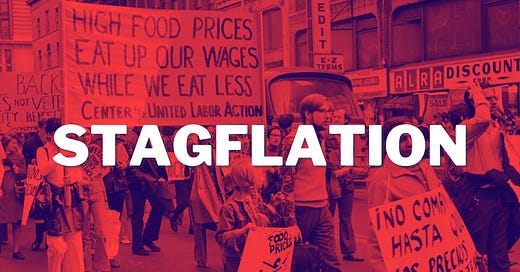As if the United States didn't have enough to worry about—geopolitical turmoil, inflation, high prices, supply chain disruptions and baby formula shortages—Americans may now be facing the possibility of stagflation.
The term refers to an environment in which uncomfortably high inflation and an economic slowdown combine with stubbornly high unemployment.
It can be an exceedingly challenging time that seems outside your control, but there are steps you can take that might help you secure your job or be prepared should the situation worsen.
Ben Bernanke, the former Federal Reserve chairman, told the New York Times in an interview he worries that the U.S. is on the path of runaway inflation—the type last seen in the 1970s.
When stagflation last occurred, there were severe job losses while prices kept going higher. How likely is something like that to happen today?
“Even under the benign scenario, we should have a slowing economy,” Bernanke said. “And inflation’s still too high, but coming down. So, there should be a period in the next year or two where growth is low, unemployment is at least up a little bit and inflation is still high. So, you could call that stagflation.”
We Don’t Need To Panic Right Now, But…
Although the prices of many goods and services are increasing, the U.S. is not now experiencing a rise in unemployment. In fact, the unemployment rate was around 3.6% in April, nearly the same as it was pre-pandemic.
The fear today is that inflation will raise prices across the board. Higher costs will mean fewer profits for companies and they’ll feel the pressure to cut costs and lay off workers. The U.S. is already starting to see this happen in tech and other sectors.
Retailers Are Feeling The Pain
On Tuesday, Target reported an unanticipated miss in its earnings projection and the company’s stock price took a major hit. According to analysts, the decline was due to increased costs, such as freight, transportation and diesel fuel prices. Target chairman and CEO Brian Cornell had told Yahoo Finance last October, "We never expected the kind of cost increases in freight and transportation that we're seeing right now."
Target is not alone. Bloomberg reported that Walmart "was headed for the worst rout since 1987." The retail giant cut its profit outlook because of inflationary pressures, "especially in food and fuel."
Walmart said that its quarterly profit was hurt by the costs of hiring, fuel and maintaining its supply chain. Walmart also shared that it will lower profit expectations for the year.
Now that the federal stimulus packages have run their course, households may find it harder to save money. With costs rising sharply, shoppers may hold back on their purchases.
According to the University of Michigan, U.S. consumer sentiment has hit the lowest level since August 2011—59.1. Despite that, retail sales increased in April by 0.9%.
Affinity Solutions CEO Jonathan Silver said, “While April sales increases are driven by an overall rise in discretionary spending, it also reflects higher-than-normal prices for goods and services. Also, many consumers are downscaling, buying lower quality versions of the same products to save money.”
If higher prices force consumers to pull back on discretionary spending, it could foreshadow difficulties for the economy—and ultimately the job market.
Bank CEOs Are Getting Concerned
On Tuesday, in a telephone interview with Bloomberg, Goldman Sachs CEO David Solomon warned that his bank’s wealthy clientele and institutional investors are preparing for a slowdown in growth and a possible decline in asset prices. Solomon also said that the country needs to figure out how to get rid of inflation as it's “extremely punitive” because families living paycheck to paycheck will have a tough time and inflation eats away at your income and savings.
Wells Fargo CEO Charlie Scharf said the U.S. is heading for an economic downturn. Speaking at the Wall Street Journal's Future of Everything Festival, Scharf said that a recession will be difficult to avoid and will have deleterious effects, such as increasing the costs of mortgages, credit cards and loans.
According to a May Bank of America Global Research study that surveyed 331 participants with $986 billion in assets under management, more than three-quarters of investment fund managers reported “below-trend growth and above-trend inflation”—stagflation.
Click here to learn what you need to do right now to prepare for the tough times ahead.
Read More Articles:
Career Experts Offer Advice For People Who Are Worried About Layoffs
Don’t Panic: How To Protect Yourself From A Possible Recession
About Jack Kelly
Jack Kelly is the CEO, founder, and executive recruiter at one of the oldest and largest global search firms in his area of expertise. He has personally placed thousands of professionals with top-tier companies over the last 20-plus years. Jack is passionate about advocating for job seekers. In doing so, he founded a start-up company, WeCruitr, at the beginning of the Covid-19 pandemic. The mission of WeCruitr is to help people in need and make the job search more humane and enjoyable. As a proponent of career growth, Jack shares his insider interviewing tips and career advancement secrets as a Senior Contributor for Forbes. He also covers timely topics related to corporations, high-profile people, Wall Street, politics and other important matters. The pieces offer insight into the news and how it may impact your career. Jack is the author of How To Get A Job In Tough Times, as well as the host of Happy And Succeeding In The Future Of Work and cohost of the Blind Ambition podcast.



